Pardon me, but I’m about to go on kind of a wonky rant. I’ve been mulling a post on the Federal budget for a few days, but something just sent me over the edge to righteous pissed off about it. The following article from the A.P. is what got me riled up:
White House: Obama to lay out spending plan
Much will be revealed at midweek, when the House and Senate are expected to vote on a budget for the remainder of this fiscal year and Obama reveals his plan to reduce the deficit, in part by scaling back programs for seniors and the poor.
The A.P. item is based on an appearance by David Plouffe on Meet The Press this morning. David Plouffe is an advisor to the President, and his appearance is to grease the wheels for President Obama’s budget proposal later this week. The A.P. may be making a bit more of Plouffe’s words than ought to be taken. Here’s the relevant part:
Video:
Transcript:So we’ve had a lot of savings in health care, we have to do more. So you’re going to have to look at Medicare and Medicaid and see what kind of savings you can get. First, squeezing them out of the system before you squeeze seniors. Secondly, on Social Security, what he said is that is not a driver right now of significant costs, but in the process of sitting down and talking about our spending and our programs, if there can be a discussion about how to strengthen Social Security in the future, he’s eager to have that discussion.
I really hope this doesn’t mean what the A.P. thinks it means. Sadly, they may be right.
The problem with the federal budget is actually really small right now, though it gets bigger down the road. You may have heard that the deficit is the largest it’s ever been. That’s only correct if inflation is not taken into account. A better measure is the deficit as a percentage of gross domestic product, a figure that currently is about 10%. We ran a much bigger deficit during World War II, and we’re currently only running a deficit about twice as high as when Ronald Reagan was in office. ( I am not going to get into whether Bush or Obama is responsible for this level, but the answer is George W. Bush.)

Now, even that 10% of GDP may seem high because the U.S. has only exceeded that twice before, but we also have to consider interest rates. The Prime Rate was 15.25% when Reagan took office, and 8.75% when he left office. It got as high as 21.5% and dropped as low as 8% in 1987, but during the Reagan administration it was usually well above 10%. This rate was 7.25% when Obama took office, and now stands at 3.25%. That’s not what the government pays in interest, but it does show the general idea. The current cost to borrow money is less than half what it was at the lowest point during the Reagan administration. It is amazingly cheap to borrow money right now.
That’s why the current deficit is really not much of a problem.
Long term, we do have a problem with our deficits. No, not with Social Security. That actually doesn’t have an issue until the late 2030s, and will require a fairly small change to fix. Our long term problem is with Medicare and Medicaid. And the problem isn’t that we have too generous of benefits. The problem is that health care is too expensive in the U.S. Western Europe has much better health outcomes than we do, for about half the cost and much less hassle.

If we paid the same as other developed countries, we wouldn’t have a long term deficit. The problem is that we’re spending recklessly. The problem is that we give too much money to doctors, insurance companies, drug companies, and the like. That’s why the Affordable Care Act (a.k.a. RomneyCare or ObamaCare), even without a public option, was good for us. It has a number of controls that bring down costs. It doesn’t eliminate the problem, but it does remove a big chunk of our future deficit.
The Republicans introduced a budget plan last week that goes the wrong way. It repeals the A.C.A. and pretty much also eliminates Medicare and Medicaid. It eliminates the deficit long term by shifting health care costs to individuals. That would be fine, and in fact preferable, if health care costs were predictable for individuals. But they aren’t, so when you get sick, or A.L.S., you have to pay for everything yourself or hope that your insurance company will. Remember, health insurance companies make money by not insuring people with health problems.
The Republican plan, which thankfully doesn’t have a chance of passing in anything like it’s current form, has all sorts of problems that I may blog about later. But how it handles Medicare is its defining set of terms.
So now Barack Obama has agreed to find ways to save money
in Medicare and Medicaid. The problem with that is that the only way to save money and not hurt individuals is to double down on the A.C.A. Introduce the public option or nationalize health care or the like. In other words, more not less socialized medicine. I’d be fine with that personally. But you know that hasn’t a chance of passing either. Obama loves compromise, and since the direction of compromise is the wrong direction on this issue, it means more health care costs will be shifted to individuals.
None of either of those plans (the Republican one or the possible Obama one) will affect health care costs overall. Just that born by the government. The Market
works to control costs in many goods, but not health care. If it did, we wouldn’t have health care inflation outpacing regular inflation for the last 30 years. There’s many reasons for this, such as health insurance adverse selection, lack of bargaining power, inability to control health care needs, and more.
The upshot of all this is that it looks like we’re going to do something we don’t need to do right now, reduce the deficit, in a way that hurts everyone but the really rich and that doesn’t actually solve the underlying problem. We’ve got a center-right President moving rightward when he should be getting more progressive. And the Obama-istas wonder why the base that gave him the nomination in 2008 isn’t so thrilled with him. Sure he’s better than McCain would have been. But it’s hard to stay excited for someone who’s selling point is well, you could have that idiot over there.
I’ll probably write more about the budget compromise that was passed last week for 2011. It moved the wrong direction too.
Discover more from King Rat
Subscribe to get the latest posts sent to your email.